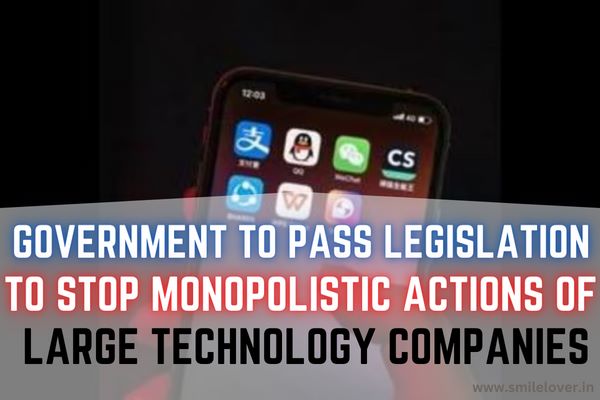GOVERNMENT AIMS TO PASS LEGISLATION TO STOP THE MONOPOLISTIC ACTIONS OF LARGE TECHNOLOGY COMPANIES

Delhi, India According to two sources, the government is mulling a proposal to draught regulations that would enable regulators to thwart the anti-competitive actions of sizable internet platforms.
According to the people, Big Tech frequently favours its own services or those of its subsidiaries on its platforms. According to the sources, who asked to remain anonymous, the European Union (EU) has implemented ex-ante regulations to prevent such acts, and India may consider doing the same after discussing with all parties.
One of them, who had firsthand knowledge of the situation, stated, "Like Europe, we may also have the Digital Markets Function (DMA), which will prevent anticompetitive behaviour by powerful web platforms which act as digital gatekeepers. He stated that such ex-ante regulation has also been proposed by the parliamentary standing committee on finance and the Competition Commission of India (CCI).
DMA was just put into effect in the EU to stop Big Tech's abusive business practices. The second official stated that "both CCI and the parliamentary panel are of the opinion that anticompetitive activities ought to be curtailed before a dominating few winds up monopolising the market."
Email inquiries went unanswered by the Ministry of Corporate Affairs (MCA), CCI, and the Indian branches of Google, Amazon, and Flipkart.
In digital markets, certain significant online platforms serve as 'gatekeepers. According to the European Commission, the Digital Markets Act "aims to ensure that these platforms behave in a fair manner online. According to the statement, failure to comply might result in fines of up to 10% of the company's annual global turnover or up to 20% in the case of persistent violations.
An executive from a large technology company claimed, under the condition of anonymity, that the Indian digital market has not yet reached maturity and that legislation along the lines of the DMA would stifle innovation. Expert opinions are divided, though.
In many jurisdictions throughout the world, ex-ante legislation for digital markets is being proposed and debated. According to Sanjay Sen, a senior attorney with the Indian Supreme Court, "what is being recommended presently in India is to build up or establish norms of conduct to ensure that users of significant digital platforms are treated fairly and are not exposed to anti-competitive behaviour." While there is no doubt that this will be advantageous in the long run, he noted, it is crucial that the rules be unmistakable and explicit.
Sen claims that CCI needs more authority to control the digital economy. "The competition law is not very effective in the digital arena in its current form. Large digital platforms may engage in self-preferencing, unauthorised use of market users' data, bundling of services, and other practices that are unfair to some smaller market users who may lack access to effective redress.
Considering the magnitude of the digital market now and it's potential for future expansion, he continued, "I consider it as a positive. Ex ante regulations, in my opinion, are better suited to handle a world of rapidly advancing technology and innovations brought by sizable platforms.
Anisha Chand, a partner at Khaitan & Co, stated that since it is still early, having an ex-ante framework in India may need to be reconsidered. "India is a fertile country that creates a lot of startups and unicorns. Ex-ante legislation with a high compliance burden runs the danger of stifling innovation and investment. The best course of action could be to first consult a larger group of stakeholders and then learn from other jurisdictions' experiences with similar laws that have already been implemented.
According to GR Bhatia, Partner at Luthra and Luthra Law Offices India, preventive regulation is standard practice across the board. There is a case for reforming CCI by creating a specialised "Digital Markets unit," as well as for passing a Digital Competition Act (comparable to the Digital Markets Act in the European Union).







